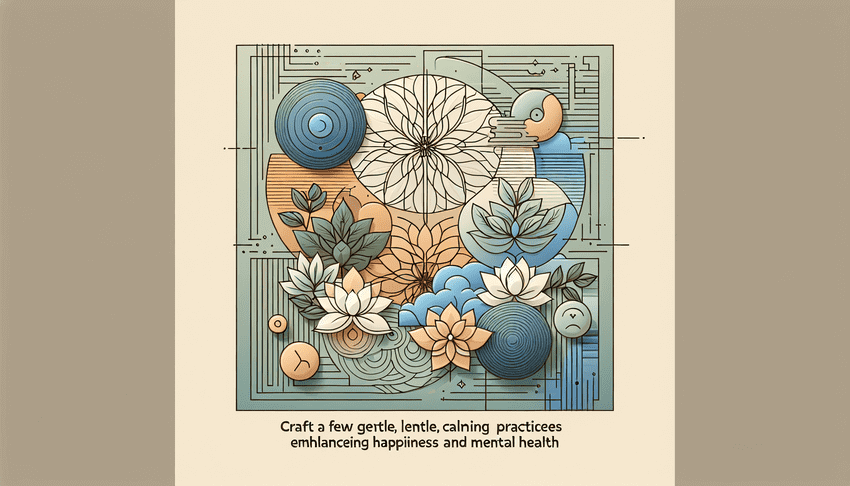Table of Contents
The Fundamentals of Mindfulness

Defining Mindfulness in The Modern World
Mindfulness, a term that has permeated the fabric of modern culture, stands as a beacon of hope in our fast-paced and often chaotic world. It is the art of maintaining a moment-by-moment awareness of our thoughts, feelings, bodily sensations, and surrounding environment with an open, nurturing attitude. While it may seem like a contemporary concept, its roots are ancient, stretching back to Buddhist traditions and philosophical practices that date over two and a half millennia.
At its core, mindfulness involves a conscious effort to be ‘present,’ to anchor ourselves in the ‘now’ without judgment or distraction. Consider the simplicity and complexity of this practice: a busy mother pauses amid the morning rush to take three deep breaths, centering her emotions before addressing her children’s needs. A businessman starts his day not by checking emails, but by savoring the warmth and aroma of his coffee, truly experiencing the moment. These snippets from everyday life exemplify how the practice of mindfulness can transform what would otherwise be a mundane or stressful routine into a sequence of enriching experiences.
One might ask, how can such a subtle change in focus have such a profound impact? Scientific research provides us with compelling evidence. Studies show that mindfulness can not only reduce stress but also improve cognitive function, emotional regulation, and even our relationships with others. It fosters an enhanced ability to deal with the unexpected, to navigate the ebbs and flows of life with resilience, providing a foundation for sustained happiness.
As we integrate mindfulness into our lives, we initiate a ripple effect. It begins within us, enhancing our perception and well-being, and extends outward, influencing our interactions and the lives of those around us. By elevating our own levels of happiness and contentment, we pave the way for creating a more compassionate and mindful society.
In conclusion, mindfulness is more than a psychological trend; it is a practical and ancient tool that has been polished and adapted for modern use. It offers a pathway to a more attuned and fulfilled existence, turning the ordinary acts of daily life into extraordinary moments of clarity and joy. As we steer our attention back to the essence of living in the present, we rediscover the serenity and pleasure that accompany life’s journey. With mindfulness, we are not just surviving the tumult of the modern world; we are thriving within it.
Enhancing Emotional Intelligence Through Mindfulness
Mindfulness practices have become a cornerstone in the quest for Mental Health Improvement. These practices, rooted in ancient traditions and refined by modern psychology, are not only about quieting the mind, but also about sharpening our Emotional Intelligence.
Emotional Intelligence, or EI, involves our ability to perceive, control, and evaluate emotions—both our own and those of the people around us. A strong EI is key for successful interpersonal communication, leadership, and personal well-being. It has been found that Happiness through Mindfulness is not a fleeting notion but a tangible outcome of consistent practice.
- At the heart of Mindful Living Techniques is the concept of focused awareness. When individuals are mindful, they are wholly present in the moment. This state of full attention fosters greater clarity in thinking and perception of emotional states. By recognizing our own emotions through mindfulness, we pave the way for enhanced self-regulation.
- Mindfulness meditation, a key Wellness Mindfulness Strategy, teaches us to observe our thoughts and feelings without judgment. This detachment leads to a deeper understanding of the root causes of emotions, bolstering our ability to manage them. Over time, mindfulness practitioners report fewer instances of being overtaken by strong emotional responses, indicating improved EI.
- Moreover, empathy—the ability to understand and share the feelings of another—grows through mindfulness. By nurturing a non-reactive awareness, one can better acknowledge the perspectives and emotions of others. This empathetic stance is crucial for effective communication and maintaining strong relationships.
Empirical research underscores the benefits of mindfulness for EI.
Studies in the field of Positive Psychology have repeatedly demonstrated that individuals who engage in regular mindfulness exercises tend to have higher EI scores. Specifically, mindfulness training enhances the area of the brain responsible for emotional regulation—the prefrontal cortex.
Through practices such as mindful breathing, body scans, and compassionate meditation, individuals learn to reduce stress and emotional reactivity. These practices lay the foundation for a resilient mindset, enabling us to navigate life’s challenges with greater ease and less emotional turbulence.
Agencies and organizations are increasingly incorporating Mindful Living Techniques into their training programs, recognizing the impact of mindfulness on employee well-being and interpersonal dynamics. Mindfulness is more than just a tool for Mental Health Improvement; it’s a transformative process that enriches our understanding of ourselves and others, leading to a more contented, balanced life.
While the road to mastering EI through mindfulness requires dedication and patience, the outcome is a more harmonious existence. Integrating mindfulness into daily life not only bolsters our capacity for Emotional Intelligence but also opens the gateway to a lasting sense of happiness and fulfillment.
Practical Applications of Mindfulness

Mindfulness-Based Stress Reduction Techniques
Mindfulness, a keystone in the fortress of Positive Psychology, presents a potent remedy to the ailment of modern-day stress. Mindfulness-Based Stress Reduction Techniques weave this principle into a practical framework, offering an oasis of tranquility in a desert of tumult.
Mindfulness-Based Stress Reduction (MBSR), a program developed by Dr. Jon Kabat-Zinn, harnesses the power of mindfulness in a structured, eight-week regimen that equips individuals with the tools to tackle stress, pain, and illness. The empirical prowess backing MBSR programs is substantial. Studies consistently demonstrate that participants who engage in MBSR experience a significant decrease in symptoms of stress and an enhancement in their overall happiness.
The benefits of MBSR aren’t confined to abstract well-being; they extend to physiological metrics as well. Research indicates that Mindfulness practice can lower blood pressure, reduce chronic pain, and ameliorate gastrointestinal difficulties. Furthermore, on a psychological level, MBSR has been shown to decrease depression and anxiety symptoms, while boosting mood regulation and enhancing emotional resilience.
What do these techniques involve, and how can one integrate them into daily life? Below are strategies and exercises to cultivate that crucial resilience against daily stressors.
- Breathing Meditation: At the heart of MBSR is the focus on breath. Concentrating on the rhythm of breathing anchors the mind in the present moment, offering a break from the constant churn of thoughts and worries.
- Body Scan: This technique involves mentally scanning your body from head to toe, noting any sensations without judgment. The body scan fosters a state of mindful awareness, connecting the practitioner to the physical self and easing tension.
- Mindful Movement: Gentle yoga or other mindful movements are integral to MBSR, emphasizing a conscious connection between body and breath, fostering both physical and mental flexibility.
Such practices, when adopted regularly, can form the bedrock for a fortress against stress. The beauty of Mindfulness lies in its accessibility; one does not need special equipment or an abundance of time. Mindfulness can be woven into the fabric of daily activities; be it while walking to work, savoring a meal, or engaging in conversation.
In conclusion, MBSR programs stand as a testament to the strength of Mindfulness in the quest for a happier life. The integration of these mindfulness-based techniques offers a holistic approach to stress management, one rooted in both ancient wisdom and contemporary science. As more individuals embrace Mindfulness, the collective wellbeing of society can bloom, creating an environment where happiness is not just sought but sustained.
Mindfulness in The Pursuit of Happiness
Mindfulness, a state of attentive awareness to the present moment, is a cornerstone of Positive Psychology and an essential ingredient for happiness. By focusing attention on the here and now, individuals can learn to engage fully with their experiences, develop greater emotional intelligence, and cultivate a sense of inner peace that contributes to sustained happiness.
Mindfulness Practices Enhance Emotional Regulation and Positive Outlook Engaging in mindfulness practices offers a profound impact on an individual’s emotional regulation. Through techniques such as mindful breathing or meditation, individuals can attain improved control over their thoughts and feelings, fostering resilience against stress and adversity. Studies have shown that those who engage in regular mindfulness exercises report lower levels of anxiety and depression, demonstrating a direct link to a positive outlook on life.
- Empirical research highlights that mindfulness training can significantly alter brain structures associated with attention and emotion, leading to an enhanced capacity for joy and serenity.
- Real-life success stories demonstrate individuals overcoming personal struggles by implementing mindfulness, translating into a happier, more fulfilling existence.
- Journaling, a mindfulness practice, allows people to reflect on daily experiences, amplifying awareness and appreciation for life’s simple pleasures.
Gratitude: A Byproduct of Mindfulness Another key aspect where mindfulness intersects with happiness is through the cultivation of gratitude. A mindful approach to life encourages individuals to acknowledge and appreciate the positive aspects, big and small. This recognition, in turn, creates a cycle of positivity that feeds into greater overall contentment. The practice of gratitude, backed by substantial academic research, indicates that those who regularly express thankfulness are more likely to report higher levels of happiness and life satisfaction.
- A study in the Journal of Personality and Social Psychology indicates that maintaining a gratitude journal leads to improved well-being.
- By simply noticing and appreciating the good in life, mindfulness cultivates a grateful disposition which greatly contributes to a sustained sense of well-being.
Improved Interpersonal Relationships through Mindful Communication Mindfulness also plays a crucial role in enhancing interpersonal relationships, integral to our happiness. Mindful listening and speaking practices allow for deeper communication, fostering stronger connections with others. The presence and attention cultivated through mindfulness enable individuals to respond rather than react, leading to more compassionate and fulfilling interactions.
- Research reveals that couples practicing mindfulness report better relationship satisfaction and communication, key components of happiness.
- Mindfulness workshops in corporate settings have shown to increase empathy among employees, improving workplace morale and personal job satisfaction.
In conclusion, happiness is not merely a fleeting emotion but a skill that can be developed and maintained through consistent mindfulness practice. By focusing on emotional regulation, cultivating gratitude, and enhancing interpersonal relationships, mindfulness serves as a powerful tool in the pursuit of long-term happiness. Infused with real-life examples and scientific evidence, the value of mindfulness in achieving a happy life is both compelling and attainable. Thus, embracing mindfulness is not just a practice but a transformative journey toward lasting happiness and fulfillment.
Summary
Mindfulness: The Gateway to Enhanced Emotional Intelligence and Happiness
In a world constantly buzzing with distractions, mindfulness offers a beacon of tranquility and the key to unlocking our emotional intelligence. Originating from deep-rooted philosophical and Buddhist practices, it invites us to experience each moment with full awareness and without judgment. This ancient technique, now grounded in scientific inquiry, shows tangible benefits for our mental health and overall happiness.
The Essence of Mindfulness Mindfulness is the gentle effort to be continuously present with our thoughts, feelings, and sensations. Daily scenarios, like a parent taking a deep breath before meeting the morning’s demands, exemplify the simple yet profound effect of this practice. By anchoring in the ‘now,’ the mundane is transformed into a series of enriching moments that can greatly enhance the quality of our daily experiences.
Scientific Backing and Benefits But why does this subtle shift matter? Research reveals that mindfulness reduces stress, elevates cognitive function, and improves emotional regulation. It equips us with resilience, allowing us to navigate life’s fluctuations with a composed, proactive mindset.
- Studies indicate that those who adopt mindfulness practices report less stress and greater emotional well-being.
- Mindfulness-Based Stress Reduction (MBSR) programs consistently demonstrate improvements in individuals’ abilities to handle life’s pressures.
- Participants in mindfulness practices often show enhanced focus and emotional resilience, fostering sustained happiness.
A Ripple Effect on Society The impact of mindfulness extends beyond personal development. It catalyzes an outward ripple effect, enhancing our interactions and the collective mental health of our society. Imagine a world where mindfulness is a norm, where daily acts of presence and appreciation thread together to build a compassionate, mindful community.
Mindfulness-Based Stress Reduction Techniques One key to managing stress and amplifying happiness lies in MBSR techniques. Practicing focused breathing, engaging in body scans, or participating in mindful movements like yoga can build resilience against daily stressors. These practices, when integrated into our routines, carve a path toward a stress-free, fulfilled life.
- Breathing Meditation: Centralizing on breathing offers a present-moment anchor.
- Body Scan: Noting bodily sensations creates a state of mindful awareness and relaxation.
- Mindful Movement: Conscious body movements foster both mental and physical suppleness.
Mindfulness Practices Enhance Emotional Regulation Engaging with mindfulness practices can profoundly affect how we regulate our emotions. Techniques like mindful breathing provide the tools to navigate and reshape our emotional landscape, leading to a healthier, more positive outlook on life.
- Empirical research underscores the neurobiological changes this training induces, expanding our ability to relish joy and serenity.
- A gratitude journal, as a form of mindfulness, can enhance our awareness and appreciation for life’s small wonders.
Gratitude: A Byproduct of Mindfulness Cultivating gratitude is a natural extension of mindfulness. Recognizing and celebrating the positives in our lives fosters a feedback loop of positivity, enhancing our sense of well-being and satisfaction.
- Studies in top psychology journals show how gratitude journals boost well-being.
- Mindfulness nurtures a thankful mindset, contributing to a sustained level of happiness.
Improved Relationships through Mindfulness Fostering interpersonal relationships is crucial for happiness, and mindfulness is a key facilitator. Mindful communication allows for meaningful exchanges, enriching our connections with others and contributing to our happiness.
- Couples who practice mindfulness report improved relationship satisfaction.
- Corporate mindfulness workshops promote empathy, enhancing personal and collective job satisfaction.
In essence, mindfulness is not just a fleeting trend but a journey of transformation. By embracing present-moment awareness and cultivating emotional intelligence, gratitude, and robust relationships, we can unlock lasting happiness. With mindfulness, we redefine our well-being and find joy in the journey, turning the ordinary into the extraordinary.
FAQ – Mindfulness for Well-being
How do mindfulness practices enhance one’s ability to regulate emotions, and what impact does this have on overall happiness and mental well-being?
Mindfulness practices enhance emotional regulation by helping individuals cultivate a nonjudgmental awareness of the present moment, allowing them to observe their thoughts and feelings without being overwhelmed or reacting impulsively. This heightened self-awareness fosters a calm and balanced mind, which contributes to overall happiness and mental well-being by reducing stress, enhancing focus, and promoting a deeper sense of peace and contentment in everyday life. Practicing mindfulness can lead to lasting changes in the brain associated with a decrease in emotional reactivity and an increase in mood stability, serving as a foundation for resilience and positive mental health.
How do mindfulness practices enhance an individual’s ability to regulate emotions and reduce stress, thereby promoting overall happiness and mental well-being?
Mindfulness practices cultivate a present-centered awareness that aids individuals in recognizing and accepting their passing emotions without overly identifying with them, akin to observing clouds drift by in the sky. This forms the cornerstone of emotional regulation, as it interrupts the habitual reaction patterns that often amplify stress. By fostering a non-judgmental relationship with our inner experiences, mindfulness opens a space for choice and calm, contributing to greater happiness and mental tranquility through a harmonious balance of thoughts and feelings.
How do mindfulness practices directly influence one’s happiness and mental health?
Mindfulness practices act as a soothing balm for the mind, allowing us to anchor ourselves in the present moment and reduce the noise of negative thoughts that often cloud our well-being. By fostering a gentle, nonjudgmental awareness of our thoughts and feelings, mindfulness strengthens our ability to regulate emotions and enhances our resilience against stress, directly contributing to an elevated sense of happiness and mental health. This transformative effect can be seen in real-life applications, such as when someone takes deep, mindful breaths before a stressful meeting, helping to calm nerves and approach the situation with clarity and composure.




